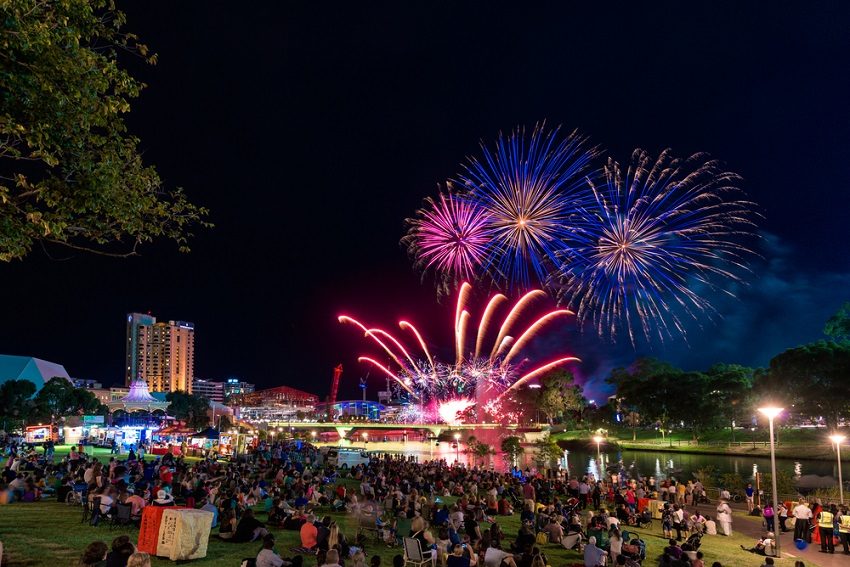Slings and Arrows: Conflicted Councillors and Complaints in Park Lands Event Calendar

Ash Whitefly looks forward to a bevy of Park Lands events in the coming year, but has reservations about the complaints, city councillors’ conflicts of interest and debt left in their wake.
A mixed response
The park lands events calendar is getting busy. The Park Lands Authority in winter reviewed its Events Management Plan about the multiple events held at council-coordinated city-edge parks. It rubber-stamped approvals for future repeats this coming summer and — in many cases — for another four years after that. That avoids repeat administration work, but it also implies that things are hunky dory and everyone is satisfied with what happens in public spaces.
Not so. A summary of the ‘level of support’ for 13 of the big events showed that, while some are popular, others aren’t. Two that stood out for the tug-of-war between ‘strongly agree’ and ‘strongly disagree’ were The Garden of Unearthly Delights (East Terrace, city) and the Royal Croquet Club (Pinky Flat, river edge near the oval). Their common features were blocked pathways, booze licences demanding lots of fencing, long licence periods (up to two months), and many late, noisy nights.
More surprises
Poll results about satisfaction with the city council’s approaches also prompted surprises. Close to half the respondents said they were ‘dissatisfied’, citing concerns over noise and smells, smoke from some events, litter, unsociable behaviour, as well as the length of some licence periods, site capacity and night and early morning trading hours. There were also problems with some events organisers who were uninterested in the rights of existing parks lessees or licence holders, and fights about territory and parking.
On July 11, when council tried to sign off the Authority’s recommendations and give event organisers the green light to start logistics planning, five councillors gave notice of ‘material conflicts of interest’ relating to various events, and left the meeting. The quorum was insufficient; a sign-off would be invalid. A bid to defer the entire meeting was defeated, leaving a residue of a handful of (non-conflicted) events safe for approval. Eventually councillors resolved to adopt each of those relating to events ‘conflicted’ by absenting themselves from the room when their particular event was voted on.
It telegraphed to anyone with even a casual interest in how big park lands events get approved; that in this small town there are many invisible links; that a surprising number of councillors sit on boards that oversee some high-revenue events, but not much about such obvious conflict gets aired in public unless a law demands it at the final approvals phase.
Full revue since
Since then there’s been a review of site criteria for each event space, including site capacity. It’s good news for the big events operators, especially those desiring Pinky Flat, facing Torrens Lake, whose capacity allowance has been increased by council from 5000 to 7000 people. Would 7000 bodies fit? That new number would allow expansion of the fenced area, and ticks a box for big events seeking OK to close off this prime spot — as well as all of its river edge pathways — from the public for up to two lucrative summer months. It’s called ‘making the criteria fit anything likely’.
The ‘visual aesthetic’
Another area of complaint in June’s summary was kilometres of 1.8m-high mesh fencing that surrounds booze-soaked park gigs. Some events last summer wrapped their steel temporary perimeter in black plastic, which made a site look like something from Manus Island.
New policy demands ‘semi-transparent’ cladding and says black plastic fencing should only be allowed where ‘back of house’ buildings sit. Fine in theory, but in practice, for example, the Royal Croquet Club, located back-of-house facilities (steel containers) around its inside perimeter, especially facing War Memorial Drive and Morphett Road — the most visual ‘fronts’ of the event. The same applied to some 2016–17 events at Rymill and Elder Parks, presenting jet black plastic fencing to the busy roads fronting those. So black will not only be back, but it never went away.
Not cricket, sorry…not croquet
Given that the Royal Croquet Club Adelaide Pty Ltd (‘The Social Creative Pty, Ltd’) jammed Pinky Flat with groovin’ punters last summer, the expansion of capacity criteria would be lucrative news — except that when the July 2017 decision came up RCC was in voluntary administration (owing a lot of money to a lot of creditors, including $137,961 to the council for hire and park land remediation costs for last summer) and thus wasn’t in line for event approval next year. The debt to council is a lot more than that left by Soundwave Festival Pty Ltd (In Liquidation) ($75,391) for using Bonython Park in 2015 (facing Port Road), which was written off by council on May 30, 2017.
It highlighted something disturbing about council’s ability as ‘landlord’ — no provisions in place to guarantee payment of site and remediation costs. Bonds and personal guarantees are now on the cards, but it says much that the city has waited until now to act. Another matter got no headlines, either. On June 27, council’s administration recommended a “bad debt write-off limit for the CEO be ‘updated from $20,000 to $100,000’”.
“Under this new delegation limit the CEO will be able to write off any bad debt below $100k,” administrators advised. This could have meant that a write-off for an event’s bad debt less than $100,000 would not need to publicly come before councillors for approval, and thus the public would never know. Councillors blocked it. Next time there’s a debt cockup above $20,000, it’ll have to become public.